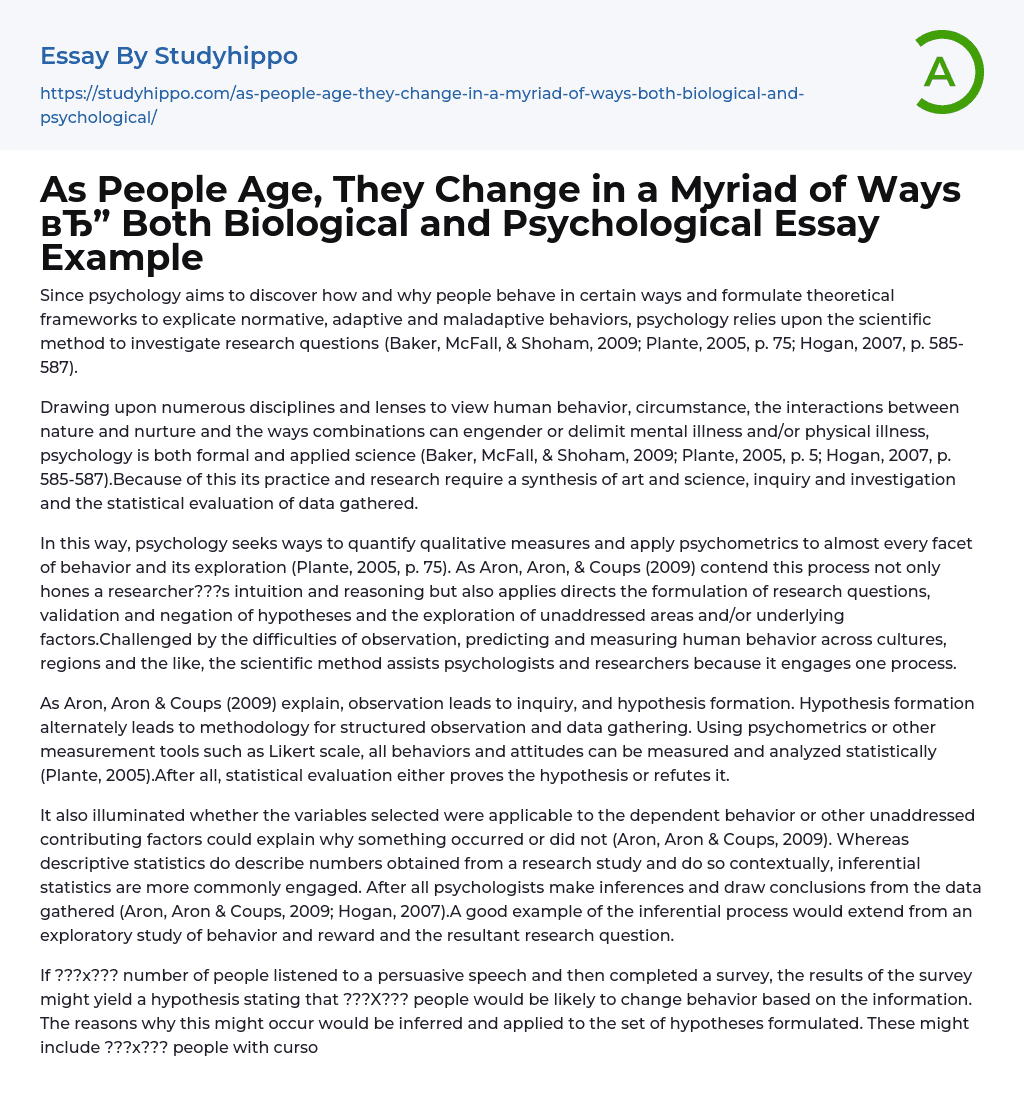

As People Age, They Change in a Myriad of Ways ??” Both Biological and Psychological Essay Example
Psychology utilizes the scientific method for investigating research inquiries related to discovering the reasons and patterns behind people's behavior. This involves developing theoretical frameworks that describe acceptable, flexible, or harmful behaviors (Baker, McFall, ; Shoham, 2009; Plante, 2005, p. 75; Hogan, 2007, p. 585-587).
Psychology is a formal and applied science that draws upon various disciplines and viewpoints to examine human behavior and the correlation between nature and nurture, which can either trigger or restrict mental and physical illnesses. According to Baker, McFall, ; Shoham (2009), Plante (2005, p. 5), and Hogan (2007, p. 585-587), psychology necessitates the integration of art and science, inquiry, investigation, and statistical analysis of collected data in both research and practice.
Psychology endeavors to quantify qualitative measures and utilize psychometrics in exploring every facet of behavior (Plante, 2005, p. 75). According to Aron, Ar
...on, ; Coups (2009), this approach enhances a researcher's intuition and critical thinking. It also directs the development of research questions, the validation or negation of hypotheses, and the investigation of unexplored areas and underlying factors. Given the challenges of observing, predicting, and measuring human behavior across diverse cultures and regions, the scientific method is a valuable tool for psychologists and researchers as it allows them to engage in one systematic process.
Observation can lead to inquiry and formation of hypotheses according to Aron, Aron & Coups (2009). The development of hypotheses subsequently results in a methodology for structured observation and information collection. As suggested by Plante (2005), all behaviors and attitudes can be measured and statistically analyzed utilizing psychometrics or other measurement instruments like the Likert scale. Ultimately, statistical assessment either confirms or disproves the hypothesis.
According t
the authors Aron, Aron & Coups (2009), selecting variables for a study should be based on whether they are applicable to the behavior being studied and whether other unaddressed factors could explain the results. Although descriptive statistics provide contextual information about the data collected in a research study, psychologists commonly use inferential statistics to draw conclusions from the data (Aron, Aron & Coups, 2009; Hogan, 2007). For example, an exploratory study on behavior and reward may lead to an inferential process that results in a research question.
If a certain number of individuals listen to a persuasive speech and then participate in a survey, the survey outcomes may suggest that a particular amount of people are likely to modify their behavior according to the provided information. These presumptions would be used to create a set of hypotheses, which could involve a variety of factors such as the tendency for people with limited knowledge to alter their behavior or the likelihood that some individuals will remain steadfast in their beliefs after hearing the speech.
Exploring deeper inquiries and deductions could reveal the underlying causes or related traits. A possible factor could be low economic status. Additionally, cultural background, ethnicity, and similar factors might affect the openness towards the message. The speech semantics could also generate further deductions. Collectively, statistical inferences and hypothesis formulation could apply to all of these aspects. Thus, a subsequent research project can be developed accordingly (Plante, 2005; Hogan, 2007).
Assessing categories of independent variables, such as socioeconomic status, education, age, and mother tongue, is crucial relative to the semantics of speech and perception of concepts. The evaluation would mostly be inferential and would not
involve statistical measures. The assessment process would involve a structured response survey and supplementary focus groups or interviews. Subsequently, the results would be compiled and analyzed to establish if the characteristics were positively correlated with language and receptivity. As the persuasive speech aimed to prompt behavior or attitude change, the survey included a related question.
Assessing characteristics or categories helps to explore the likelihood of behavior. Although numbers reveal the relationship between the characteristics and categories, graphing the results can uncover additional hidden variables. This graphic representation provides researchers with an alternative snapshot of the data and is meaningful in many ways (Aron, Aron & Coups, 2009). Choosing the most suitable visual chart can either enhance or lessen the findings. Nevertheless, graphic representations can also confirm or challenge hypotheses, provoke further research questions, and/??or stimulate readers' curiosity.
Any and/or all of these possibilities are likely in the scientific method cycle used by psychology to discern the validity of a hypothesis or theoretical tenet. As demonstrated in prior exploration, psychology relies on methodology from both science and social science. Statistical evaluation plays a crucial role in separating and/or reconciling inquiry and reason, and aids researchers in uncovering truth through individual hypotheses and studies. References: http://www.ncbi.nlm.nih.gov/pmc/articles/PMC2943397/ http://rap.ucr.edu/jrp_triad.pdf
- Abnormal Psychology essays
- Social Psychology essays
- Developmental Psychology essays
- Jean Piaget essays
- Positive Psychology essays
- Classical Conditioning essays
- Counseling essays
- Psychoanalysis essays
- Educational Psychology essays
- Behaviorism essays
- Authority essays
- Operant Conditioning essays
- Maslow's Hierarchy Of Needs essays
- Mental Health essays
- Personality Psychology essays
- Psychotherapy essays
- Family Therapy essays
- Stanford Prison Experiment essays
- Abraham Maslow essays
- Erik Erikson essays
- Cognitive Psychology essays
- Sigmund Freud essays
- Attachment Theory essays
- Supersize Me essays
- Individual essays
- Infant essays
- Childhood essays
- Adolescence essays
- Growth Mindset essays
- Is Google Making Us Stupid essays
- Childhood Memory essays
- Positive Attitude essays
- Reinforcement essays
- Archetype essays
- Maturity essays
- Deception essays
- Certainty essays
- Conformity essays
- Aggression essays
- Behavior essays
- Human Behavior essays
- Obedience essays
- Adult essays
- Procrastination essays
- Morality essays
- Altruism essays
- Human Sexuality essays
- Role Model essays
- Perseverance essays
- Expressive essays



